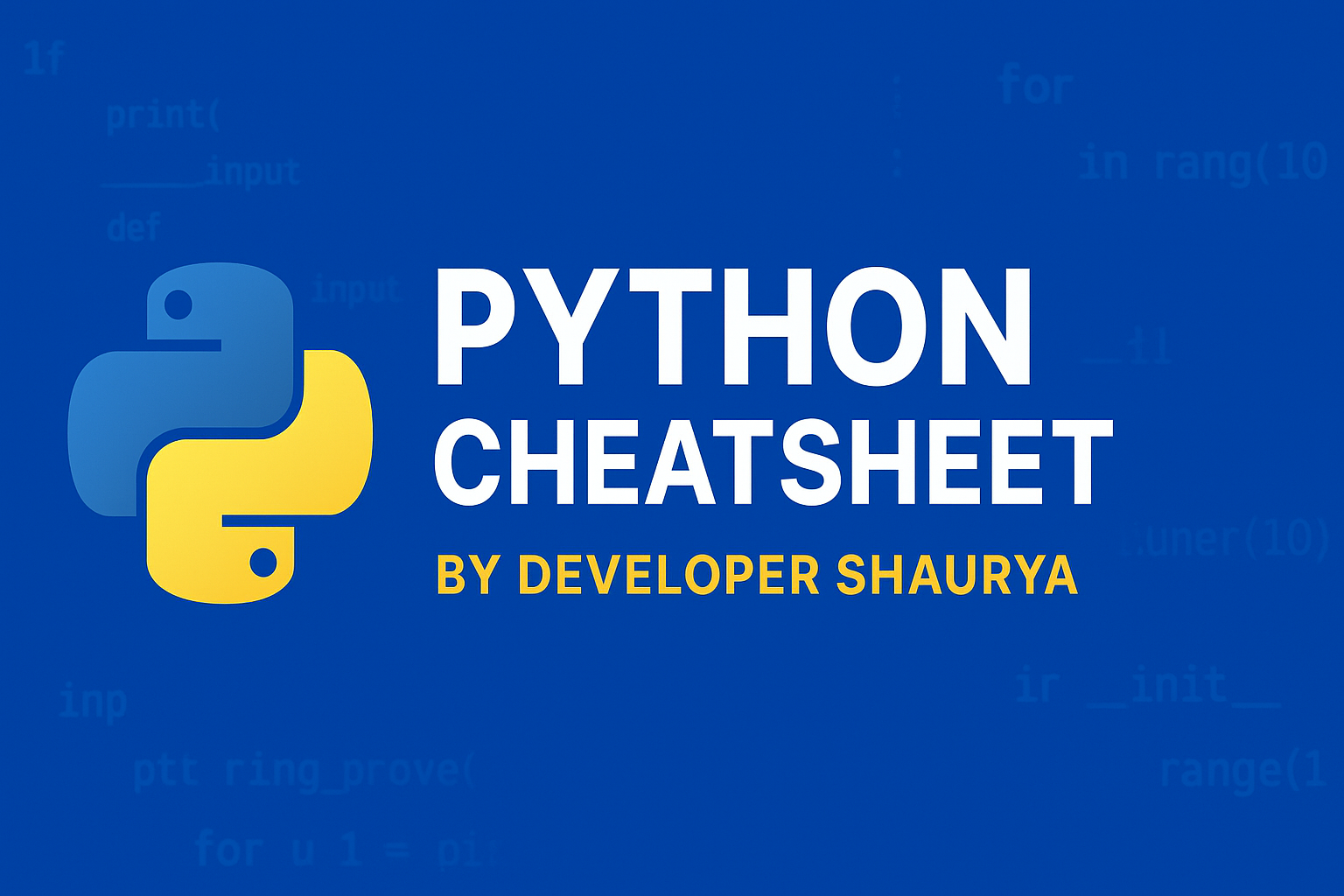This Cheatsheet covers these all topic from basic to advance concept of Python
- 1. Basics
- 2. Data Types & Casting
- 3. Collections
- 4. Operators
- 5. Conditionals & Loops
- 6. Functions
- 7. File Handling
- 8. Exceptions
- 9. OOP (Classes)
- 10. Modules & Pip
- 11. Decorators
- 12. Generators & Iterators
- 13. Context Managers
- 14. Typing & Annotations
- 15. Dataclasses
- 16. Async / Await
- 17. Regex
- 18. Data Science Basics
- 19. Database (SQLite)
- 20. Testing
- 21. Web (Flask Example)
1. Basics
print("Hello, World!")
x, y = 10, 3.14
name = "Alice"
is_active = True
print(type(x)) # <class 'int'>
2. Data Types & Casting
int(), float(), str(), bool(), complex()
s = "Python"
print(s.lower(), s.upper(), s[::-1]) # reverse
3. Collections
# List
fruits = ["apple", "banana"]
fruits.append("mango")
fruits[0]
# Tuple
t = (1, 2, 3)
# Set
s = {1, 2, 2, 3}
s.add(4)
# Dictionary
person = {"name": "John", "age": 25}
person["city"] = "NY"
4. Operators
+, -, *, /, //, %, ** # arithmetic
==, !=, >, <, >=, <= # comparison
and, or, not # logical
in, not in # membership
5. Conditionals & Loops
if x > 5:
print("big")
elif x == 5:
print("equal")
else:
print("small")
for i in range(5):
print(i)
while x > 0:
x -= 1
6. Functions
def greet(name="Guest"):
return f"Hello, {name}"
# Lambda
square = lambda n: n*n
# Comprehensions
evens = [x for x in range(10) if x % 2 == 0]
7. File Handling
with open("file.txt", "w") as f:
f.write("Hello")
with open("file.txt", "r") as f:
print(f.read())
8. Exceptions
try:
x = 1/0
except ZeroDivisionError:
print("Error!")
finally:
print("Done")
9. OOP (Classes)
class Person:
def __init__(self, name):
self.name = name
def greet(self):
print(f"Hi, I’m {self.name}")
p = Person("Alice")
p.greet()
10. Modules & Pip
import math, random
print(math.sqrt(16), random.randint(1,10))
# Pip
# pip install requests
11. Decorators
def log(func):
def wrapper(*args, **kwargs):
print("Calling", func.__name__)
return func(*args, **kwargs)
return wrapper
@log
def hello():
print("Hello")
hello()
12. Generators & Iterators
def countdown(n):
while n > 0:
yield n
n -= 1
for num in countdown(5):
print(num)
13. Context Managers
class MyFile:
def __enter__(self): print("Open"); return self
def __exit__(self, *args): print("Close")
with MyFile() as f:
print("Inside")
14. Typing & Annotations
def add(x: int, y: int) -> int:
return x + y
15. Dataclasses
from dataclasses import dataclass
@dataclass
class Point:
x: int
y: int
p = Point(1,2)
print(p)
16. Async / Await
import asyncio
async def say_hi():
print("Hi")
await asyncio.sleep(1)
print("Bye")
asyncio.run(say_hi())
17. Regex
import re
txt = "Python 3.12"
match = re.search(r"\d+\.\d+", txt)
print(match.group()) # "3.12"
18. Data Science Basics
import numpy as np
import pandas as pd
import matplotlib.pyplot as plt
arr = np.array([1,2,3])
df = pd.DataFrame({"A":[1,2], "B":[3,4]})
plt.plot([1,2,3],[4,5,6]); plt.show()
19. Database (SQLite)
import sqlite3
con = sqlite3.connect("test.db")
cur = con.cursor()
cur.execute("CREATE TABLE IF NOT EXISTS users(id INT, name TEXT)")
cur.execute("INSERT INTO users VALUES(1, 'Alice')")
con.commit()
20. Testing
import unittest
def add(x,y): return x+y
class TestMath(unittest.TestCase):
def test_add(self):
self.assertEqual(add(2,3), 5)
unittest.main()
21. Web (Flask Example)
from flask import Flask
app = Flask(__name__)
@app.route("/")
def home():
return "Hello Flask!"
if __name__ == "__main__":
app.run()
All CheatSheets view
Checkout other Cheatsheets
Checkout My YouTube Channel
Read my other Blogs
- Top 5 Mistakes Beginners Make While Learning to Code (And How to Avoid Them)
- Best Programming Languages to Learn in 2025 (and Why)
- Before You Learn Web Development: The Advice No One Gave Me
- How to Start Coding in 2025: Beginner’s Roadmap
- Why Coding is Important: The Language of the Future
- Are Coding and Programming the Same? – The Complete Truth You Need to Know
- Will Coding Be Replaced by AI?
- C++ Programming: Everything You Need to Know
